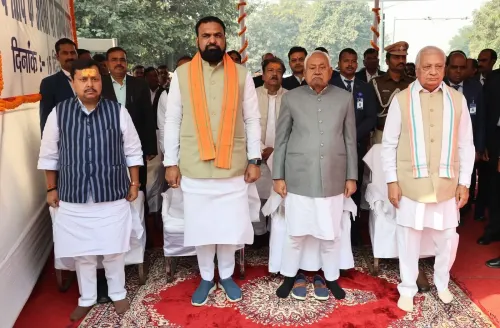Is India Collaborating with Over 60 Nations on Space Technology and Satellite Communication?

Synopsis
Key Takeaways
- India has partnered with over 60 countries for space technology.
- Major collaboration areas include satellite navigation and planetary exploration.
- ISRO is working on significant joint projects with NASA and JAXA.
- The Indian National Space Promotion and Authorization Centre has been launched to support private sector involvement.
- The Indian Space Policy, 2023 aims to foster a thriving space ecosystem.
New Delhi, July 23 (NationPress) India has formed partnerships with over 60 countries in the realm of space technologies and satellite communication, as stated by Jitendra Singh, the Union Minister of State (Independent Charge) for Science and Technology, during the ongoing Monsoon Session of Parliament on Wednesday.
In a written response in the Lok Sabha, Singh provided insights into India's collaborations in space technology along with the support extended to the private sector for executing large-scale missions.
“Documents for space cooperation have been signed with 61 nations and five multilateral organizations. The primary areas of collaboration include satellite remote sensing, satellite navigation, satellite communication, space science, planetary exploration, and capacity building,” Singh elaborated.
He mentioned that the Indian Space Research Organization (ISRO) is currently collaborating with NASA on the NISAR (NASA-ISRO Synthetic Aperture Radar) project, which is scheduled for launch later this month.
Moreover, ISRO is in partnership with CNES (French National Space Agency) on a joint satellite mission called ‘TRISHNA’ (Thermal Infrared Imaging Satellite for High Resolution Natural Resource Assessment), which is still in the planning phase.
ISRO and JAXA (Japan Aerospace Exploration Agency) have completed a feasibility study aimed at a collaborative lunar polar exploration mission. Additionally, ISRO is working with NASA and Axiom Space to send an astronaut to the International Space Station, Singh noted.
The Minister also emphasized the liberalization of the space industry to engage the private sector and the establishment of the Indian National Space Promotion and Authorization Centre (IN-SPACe), which facilitates large-scale space missions.
Furthermore, he highlighted the introduction of the Indian Space Policy, 2023, aimed at cultivating a vibrant space ecosystem.
Various initiatives such as a technology adoption fund, a venture capital fund for the space sector, a seed fund scheme, pricing assistance, mentorship, and technical labs have been launched to support startups and Non-Governmental Entities (NGEs) in the space domain.
Up until March, the government has also “signed 79 MoUs with NGEs and issued 77 authorizations,” Singh stated.










